7. Dead Man Walking
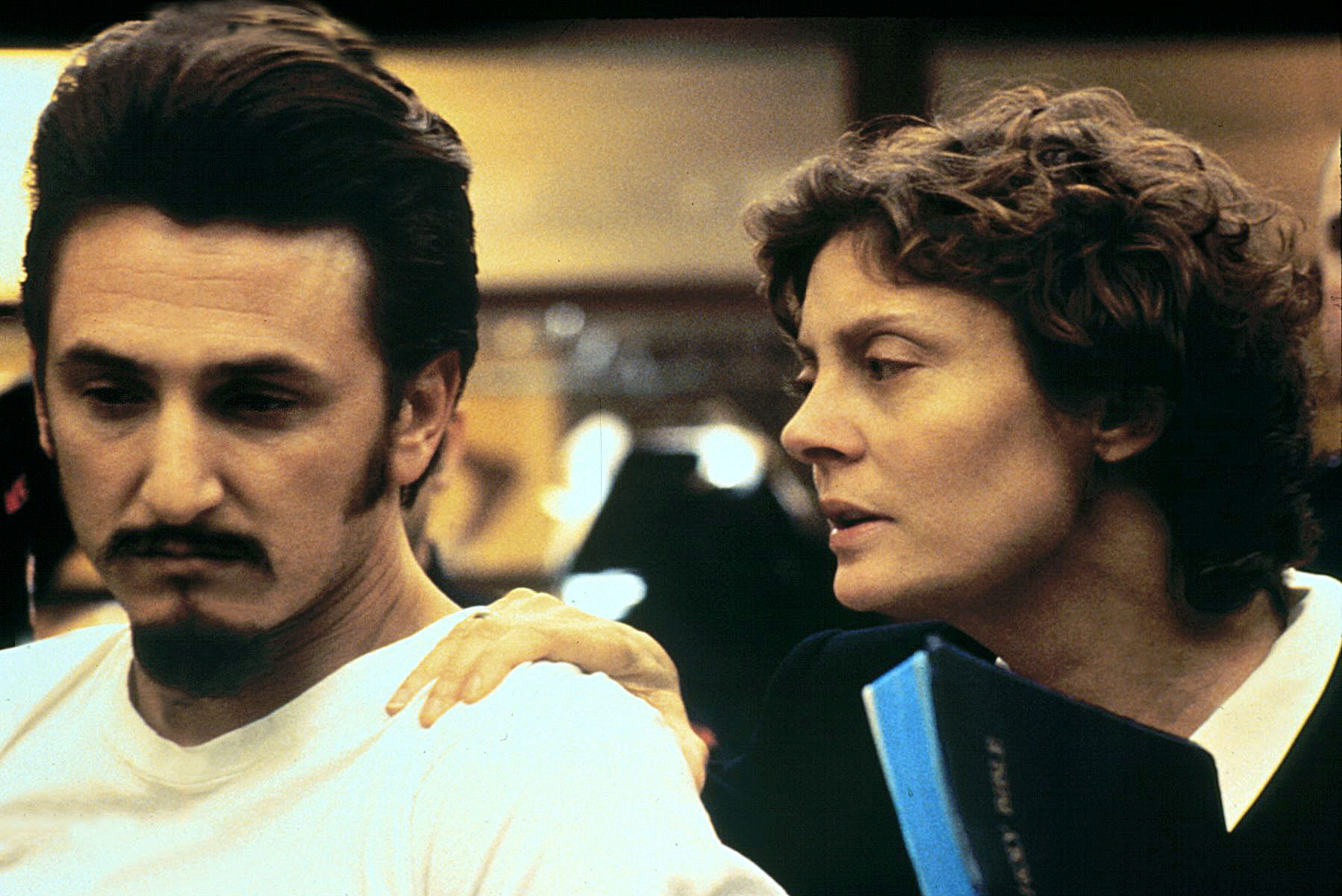
At first glance, this film’s plot doesn’t look overly thrilling. However, it proves to be an exciting and serious experience that isn’t interested in forcing its message down the audience’s throats, but instead offers a true portrayal of the death penalty debate and raises important doubts regarding the philosophy of law.
Susan Sarandon plays Sister Helen Prejean, a nun who’s intrigued by the story of a death row inmate named Matthew (Sean Penn) and his possible innocence. She tries to understand him, little by little, in an attempt to figure out his participation in the crimes of which he’s accused. Though Sister Prejean’s main goal is for him to finally show regret and accept Jesus Christ, she struggles on every step of the way to protect this man from himself.
The scene takes place in an isolated jail cell for death row inmates. Sister Prejean is visiting Matthew the day before his execution; they’re separated by a thick glass and a cop is sitting behind him, ever watchful of any move he makes. Although the characters are facing each other in a classic shot-reverse shot style, we can see both of their faces at all times because they’re reflected on the glass.
They talk about God and the divine salvation Matthew wants to be worthy of. The nun explains to him the sacrifice that’s involved and he’s not happy about it. Watching them interact is very intense; they’ve been separated by metal bars and other restrictions in all of their other conversations, but now we see their faces reflect on the glass as they become close on a personal level. The performances from Sarandon and Penn are flawless, earning Sarandon an Oscar for Best Actress, and adjust nicely to the necessities of this marvelous scene.
Best lines: Matthew Poncelet: “You ever get lonely?”
Sister Helen Prejean: “Yeah, Sure. Sometimes on Sundays when I smell the neighborhood barbecues, and I hear all the kids laughing and I’m sitting in my room (laughs) I feel like a fool.”
6. The Seventh Seal
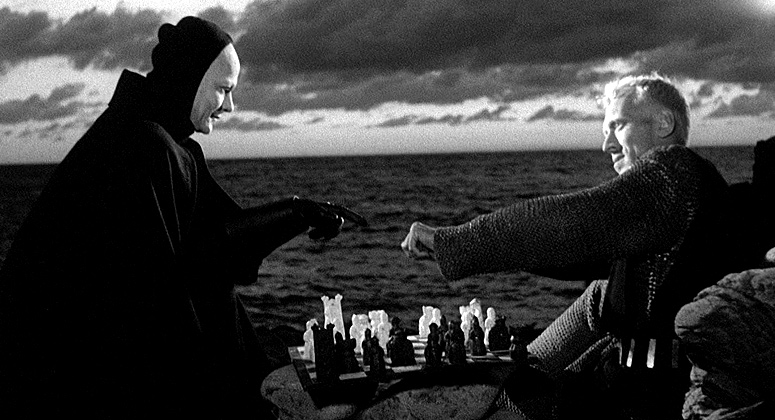
Ingmar Bergman is one of the most important pioneers of philosophical cinema. His movies are deep and require multiple viewings to be fully understood.
“The Seventh Seal” is famous because of the interactions between Death and the main character, Antonius Block, played by Max Von Sydow. They play chess with a beautiful marine landscape as the background and, from that point on, the entity never stops chasing Antonius.
Their best scene together takes place in a small church, where Antonius is confessing his sins to a priest through the metal bars of a confessionary. The main character wishes to believe in God, but is frustrated by the lack of proof of his existence; faith is not enough for him, and it saddens his soul. The priest is actually Death in disguise, and he asks Antonius a few questions in an attempt to find out why he doesn’t want to die. Antonius says he desires knowledge, to meet God in person, to uncover the mystery; he’s tired of assumptions and empty prayers.
The whole setup for this dialogue is masterful. The lighting points out the duality of Death; he’s covered in a black robe, but his face is white and shiny. The performances are passionate and the dilemma the main character faces is the most universal of all, making the scene particularly endearing, due to the fact that anyone could relate to Antonius’s existential suffering.
Best lines: Antonius Block: “We must make an idol of our fear, and call it god.”
5. The Godfather
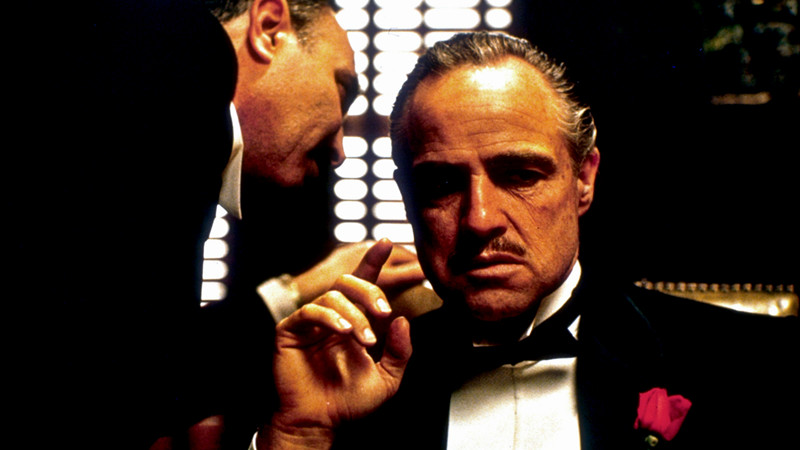
I’m sure that introducing one of the best characters in the history of cinema wasn’t an easy task for Francis Ford Coppola and his crew. Vito Corleone is considered by many to be the most badass guy ever put onscreen. The first time we meet him, he’s a sharply dressed old man who doesn’t look too scary. However, the way he talks and how everyone respects him, to the point where even a large violent man like Luca Brasi practices out loud what he’s going to say to him like a nervous toddler before confessing a misbehavior, all confirms that the Godfather’s rise to power must have been truly savage.
In this scene, a man is asking Vito to avenge his daughter after a group of guys ruthlessly beat her. Corleone is insulted by the way this man is treating him, like he was some unknown vulgar hitman; the Godfather indirectly calls him a hypocrite, because he only acknowledges their friendship when he wants a favor.
The tension comes from our ignorance about the characters we see on the screen. We don’t know how the important man in a fancy suit is going to react to the desperate man’s clumsy approaches, but we learn that Corleone is a just individual and has a moral code in which family is above everything.
The classic dark cinematography that “The Godfather” franchise is known for, as well as Marlon Brando’s amazing performance with cotton in his mouth and caressing a random cat he found around the set, make this scene an unforgettable introduction to the best movie franchise of all time.
Best lines: Bonasera: “How much shall I pay you?” [The Don turns away dismissively, but Bonasera stays on]
Don Corleone: “Bonasera, Bonasera, what have I ever done to make you treat me so disrespectfully? If you’d come to me in friendship, this scum who ruined your daughter would be suffering this very day. And if by some chance an honest man like yourself made enemies they would become my enemies. And then, they would fear you.”
B: “Be my friend… Godfather.”
4. Pulp Fiction
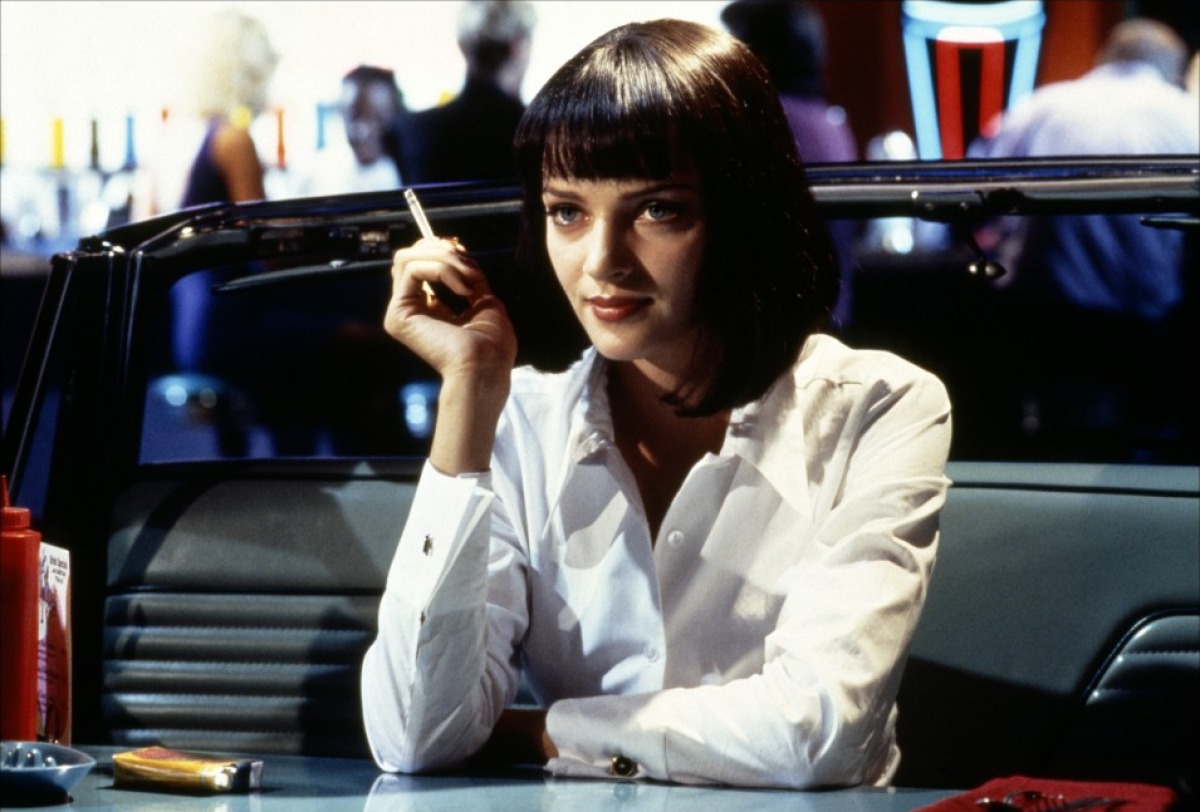
This movie is any film student’s dream. Not just because Quentin Tarantino created an instant classic that was nominated for Best Picture at the Oscars, but because most elements of “Pulp Fiction” are, ironically, the ones that dominate indie shorts, even before the release of this masterpiece. The difference is that Tarantino orchestrated them all perfectly, with professional actors, awesome cinematography, a perfect script, off-the-charts creativity, a small budget, and a ton of movie references.
If you’ve got a flawless script on your hands, there are going to be numerous great scenes to choose among the best, especially those with razor-sharp dialogue, due to Tarantino’s signature style. In my opinion, the best one is between Vincent Vega and Mia Wallace at a throwback diner called Jack Rabbit Slims.
Vega is having a chat with his boss’s wife in this cool 50’s themed restaurant. Steve Buscemi, who played a guy that hated tipping in Tarantino’s “Reservoir Dogs”, is now a waiter. He takes the couple’s orders while they make small talk, and their outstanding chemistry carries the entire scene. This is the first time they’re having a proper conversation, but the characters are so well fleshed out and the actors are so good at their jobs that it all feels natural.
The dialogue culminates with the classic dance competition we all know. And if you have seen how that bit was filmed, then you are aware that Tarantino is who loves that scene the most.
Best lines: Mia: “Don’t you hate that?”
Vincent: “What?”
M: “Uncomfortable silences. Why do we feel it’s necessary to yak about bullshit in order to be comfortable?”
V: “I don’t know. That’s a good question.”
M: “That’s when you know you’ve found somebody special. When you can just shut the fuck up for a minute and comfortably enjoy the silence.”
3. Inglourious Basterds
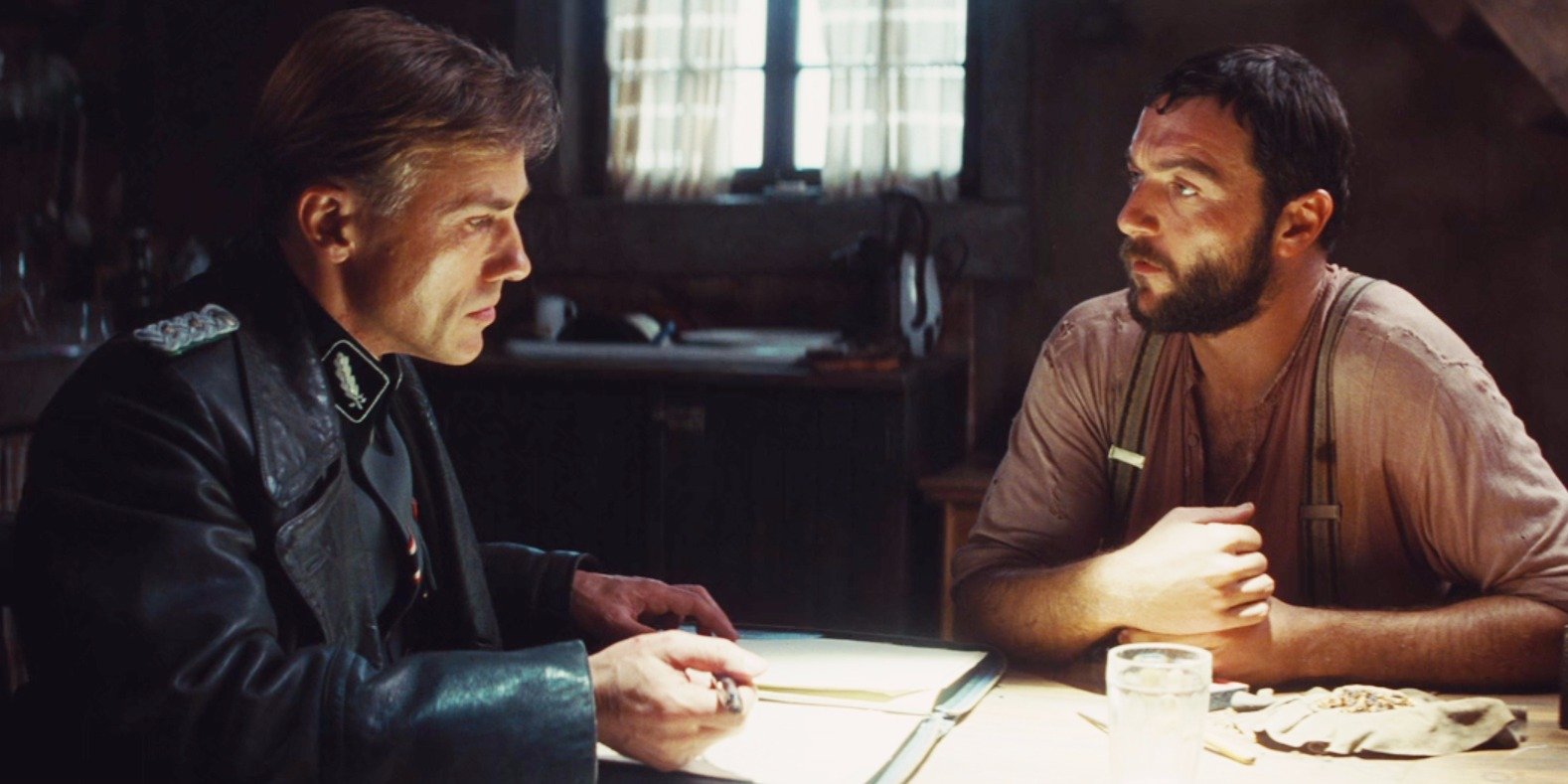
I think that Perrier LaPadite was the man with the worst luck in “Inglourious Basterds”, and that’s saying something. Some could argue that the most unlucky character was the young man in the bar who was killed the day his son was born, or Michael Fassbender’s character, who was shot to dead before he could fully share his sexiness with the world, but those people would be wrong.
Poor Perrier had to hide his neighbors under the floor of his house, awaiting the visit of a Nazi squad led by the most dangerous man in the world, while having to keep providing for his wife and daughters, who could be killed or imprisoned if things don’t go well. It’s fair to say that he was under pressure. This is how the film starts, a good man preparing himself to face evil, and things certainly don’t go well.
Hans Landa, played by the incredible Christoph Waltz (who earned an Oscar for his efforts in this film), butchers him with his fast paced conversation, undeniable confidence, multilingual talents and demonic wisdom. LaPadite, the manly farmer with enough balls to face the Nazis by himself, ends up crying and reveals his friend’s hiding spot. It’s all over and we never know what happens to him and his family after that.
The dialogue is smart and gives us a peek into a Nazi soldier’s mind. We see both men in the same shot when the intensity is low; when the climax is coming, the pressure also rises with full close-ups of the character’s reactions and then bullets swarm the house.
Best lines: Col. Hans Landa: “If a rat were to walk in here right now as I’m talking, would you treat it to a saucer of your delicious milk?”
Perrier LaPadite: “Probably not.”
C: “I didn’t think so. You don’t like them. You don’t really know why you don’t like them. All you know is you find them repulsive. Consequently, a German soldier conducts a search of a house suspected of hiding Jews. Where does the hawk look? He looks in the barn, he looks in the attic, he looks in the cellar, he looks everywhere *he* would hide, but there’s so many places it would never occur to a hawk to hide. However, the reason the Führer’s brought me off my Alps in Austria and placed me in French cow country today is because it does occur to me. Because I’m aware what tremendous feats human beings are capable of once they abandon dignity.”
2. The Master
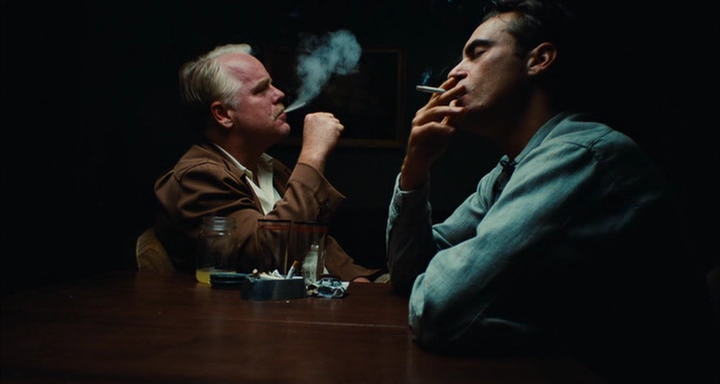
If somebody asked me what this movie is about, I’ll probably stand still while my eye twitches and my mind struggles to form a sentence that doesn’t sound totally crazy. I would probably end up saying: “It’s about a crazy guy who makes his own booze, who boards a strange boat (owned by a cult) by mistake and ends up befriending the leader. Certified great film, bro.” Although my outline doesn’t sound very convincing, “The Master” is a spectacular piece of art.
The dialogue scene takes place in said boat; after Freddie Quell (played by Joaquin Phoenix) shows up on accident, he encounters Lancaster Dodd (Philip Seymour Hoffman) and they hit it off due to both being crazy, but in different ways.
Lancaster proceeds to psychoanalyze Freddie in an unusual way; he asks a series of questions in order to find out who he really is and to look for the root of his problems. When Lancaster feels that Freddie is lying, he asks the same question again, and again, until he gets a satisfying answer. Lancaster then tells Freddie to not blink, and if he does, he would start the questioning all over again. This demand adds more tension to the already fervent situation.
The actors deliver the best performances of their respective careers. Hoffman is serious and demanding, while Phoenix is insane and unstable. They make a frightening combination in this scene; along with minimal lightning and a great script, it’s only topped by the number one on this list.
Best lines: Lancaster Dodd: “Do you love Doris?”
Freddie Quell: “Yes.”
L: “Is she the love of your life?”
F: “Yes, sir.”
L: “Then why aren’t you with her?”
F: “I don’t know.”
L: “Yes you do. Tell me why you are not with her if you love her so much.”
F: “I told her I’d come back and I never went back and now I just… I gotta get back to her.”
L: “Why don’t you go back?”
F: “I don’t know.”
L: “Close your eyes. Starting now, you are not to blink. If you blink we go back to the start.”
1. There Will Be Blood
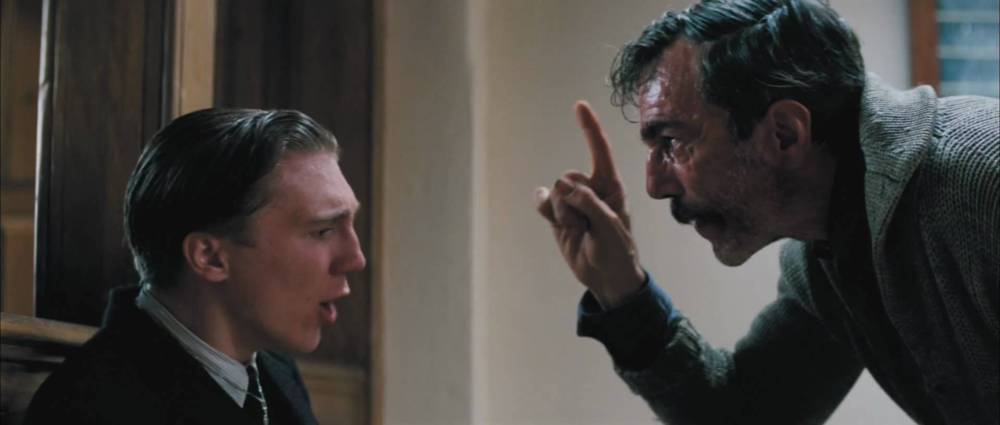
As the title suggests, blood is certainly in this movie, though it’s represented by oil. The drillers baptize their children with the chemical and a variety of religious references are made throughout the film that confirm this analogy.
One of them is the conflict between the oil tycoon and protagonist Daniel Plainview (played by Daniel Day-Lewis) and rural priest Eli Sunday (Paul Dano). Eli acts humble and peaceful upon Daniel’s visit to extract oil located on the priest’s family propriety. However, it’s clear that Eli is just as petty and egocentric as Daniel, he just chooses to hide this fact under the veil of religion, while Daniel disguises himself as a family man.
Just when greed finally corrupts Daniel’s entire spirit, Eli chooses to pay him a visit in his fancy home bowling alley, in an attempt to sell him an oil business. Daniel notices that the priest is desperate, so he says that he will agree to the deal if Eli admits that his faith is a farce. After a moment of doubt, Eli accepts his conditions, putting money over his life’s passion. Daniel then confesses that he has already drained the oil well that he’s offering, thus completely destroying the young priest. He goes maniacal and busts Eli’s head with a bowling pin.
The scene’s build-up is fantastic. The conflict between these two goes way back, and is finally resolved in the grittiest way possible. Both performances are spectacular, especially the one from Daniel Day-Lewis, who earned his second Oscar for Best Actor for this role. He’s cruel and soulless as he crushes his counterpart with anger and satisfaction. The cinematography is stunning throughout the whole film, where every despicable act is committed in plain sight, like there’s no escape from the guilt and shame.
Best lines: Eli Sunday: “If you would just take…”
Plainview: “You lose.”
E: “…this lease, Daniel…”
P: “Drainage! Drainage, Eli, you boy. Drained dry. I’m so sorry. Here, if you have a milkshake, and I have a milkshake, and I have a straw. There it is, that’s a straw, you see? Watch it. Now, my straw reaches acroooooooss the room and starts to drink your milkshake. I… drink… your… milkshake!” [sucking sound]
Author Bio: Juan studies philosophy. He love films and music and plans to go to film school with his cat.